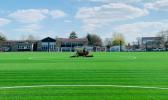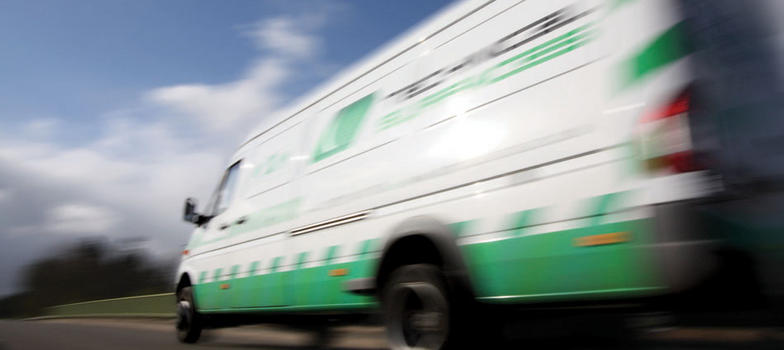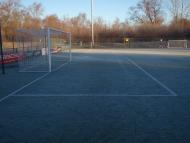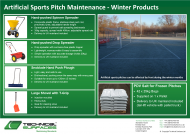A common misconception with synthetic or artificial sports pitches is that they are 'All Weather', so much so that they are often referred to as just the 'All Weather Pitch'.
Whilst in most instances this is a safe assumption (if maintained correctly), the weather conditions that a 3G or sand filled astro surface cannot necessarily withstand is a drop in temperature, and the inevitable frost and freezing conditions that ensue.
During the winter months an artificial grass pitch will retail a large moisture content and inevitably this moisture will freeze, causing the surface to become hard and often unsafe to play on.
It is not uncommon for a synthetic surface to remain frozen even when surrounding natural grass areas have thawed. This is due to the low core temperature of artificial turf and the insulating effect that the infill and carpet creates.
-
Snowfall
This can then be compounded with snowfall, which will quickly settle on the surface and stay for a longer period as it sits on the frozen carpet. Again, the snow will often melt quicker on surrounding natural grass and hard standing areas before it melts on the astro pitch, due to the insulated low core temperature of the surface.
Over the past couple of winters many artificial grass pitches have had to be closed for two or more weeks due to heavy snowfall. Unfortunately, once the snow is on the surface it is very difficult to move, particularly if it has been left for a day or more. If it can be moved then there is also the problem of where to stockpile the snow until it melts.
The easiest solution to this is to accept that nothing can be done and close the pitch until it thaws and becomes safe to use. However, we appeciate that this can result in cancelled fixtures and bookings and therefore loss of important revenue and possibly customers.
-
Frost & Frozen Pitches
Whilst snow presents its own unique problems with little that can be done, a frozen or frosty surface can often be prevented by applying a specialist PDV (pure dried vacuum) salt to the surface. PDV salt has few impurities so is less likely to cause damage or contamination to an artificial pitch. Other products such as rock salt, grit or chemical-based solutions should be avoided at all costs - as once dissolved, they could cause contamination and damage to the playing surface.
PDV salt should be considered as a preventative anti-freeze application rather than a de-icer. Typical guidance would be to spread a layer of approx. 50gm per m2 and brush / work it into the surface so that it takes effect. Please be aware that each astroturf pitch may differ and initially it may be a trial-and-error to determine the correct quantity needed. Also bear in mind that one application will not necessarily be a long-term remedy.




